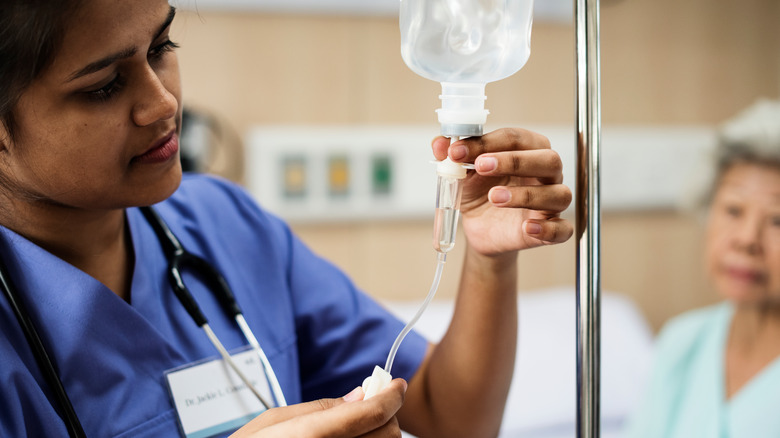When Should You See A Doctor For Dehydration?
Our body loses water not just through our urine, but also through our skin, kidneys, lungs, and gastrointestinal tract (via StatPearls). When we lose water at a faster rate than we're able to replenish it, the result is dehydration. The condition can impact anyone of any age but is reported to affect as many as 28% of older Americans. Dehydration is a common cause of hospitalization, and it can lead to disease or death.
Children and older adults are particularly susceptible to potentially harmful cases of dehydration, according to the Mayo Clinic. In babies or young children, dehydration may present itself in the form of dry mouth, sunken-in eyes or cheeks, no wet diapers for three hours, a lack of tears when crying, fussiness, or a sunken soft spot on top of the head. For adults, symptoms of dehydration include excessive thirst, reduced urination, fatigue, confusion, dizziness, and urine that is dark in color.
Symptoms of dehydration should not be ignored. However, there are varying degrees of dehydration and some may be treatable at home (per Heritage Urgent & Primary Care). Knowing this, how can we tell when dehydration warrants medical attention?
Varying levels of dehydration
In cases of mild to moderate dehydration, Heritage Urgent & Primary Care explains that healthy adults may experience feelings of thirst, a sticky and dry mouth, dry skin, headache, muscle cramping, infrequent urination, and urine that is dark yellow in color. Oftentimes, mild to moderate cases of dehydration may be able to be treated on one's own. Health experts suggest slowly drinking water or beverages containing electrolytes. Alternatively, you can also consume ice cubes or popsicles to rehydrate. Dehydrated individuals should avoid coffee, tea, or soda, as these drinks can increase urination, causing you to lose more liquid. It's important to note, however, that some cases of moderate dehydration may require an emergency room visit for fluid treatments through an IV.
In cases of severe dehydration, individuals may experience an accelerated heartbeat or breathing, lethargy, no urination, pee that is extremely dark in color, dizziness, confusion, fainting, or more (per Heritage Urgent & Primary Care). Such symptoms require immediate medical attention and individuals should seek care through the closest hospital or urgent care clinic.
While milder cases of dehydration may not require hospital care, the Mayo Clinic encourages individuals to keep an eye out for symptoms that last over 24 hours, such as diarrhea, increased sleepiness, bloody or black stool, or the inability to retain fluids. These are signs that one should reach out to their physician.


